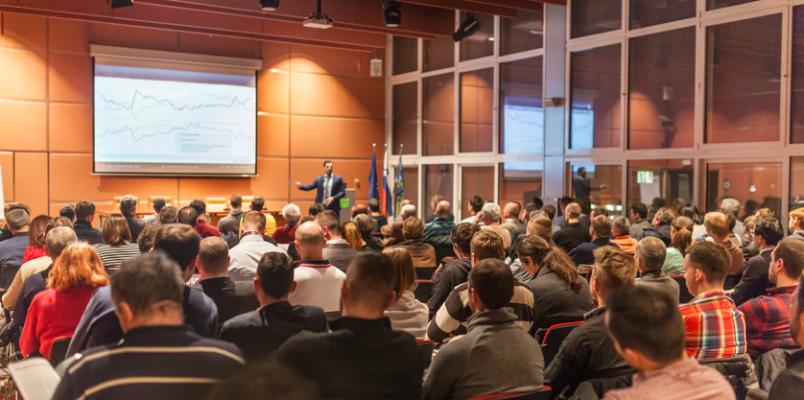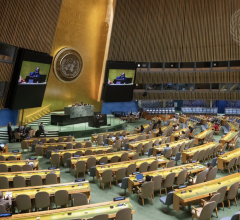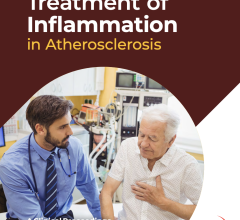
Getty Images
The Heart Rhythm Society (HRS) announced the full lineup of speakers and sessions, including late-breaking clinical trials and science sessions, for Heart Rhythm 2023, the society's 44th annual meeting, taking place May 19-21, in New Orleans. This year's late-breakers feature some of the most significant and exciting breakthroughs in the field of EP, and session categories include:
- Late-Breaking Randomized Clinical Trials: First-time presentation of primary or major secondary results from a prospective, randomized clinical trial
- Late-Breaking Clinical Innovations: First-time presentation of results of clinical applications of novel therapeutic or diagnostic approaches to heart rhythm disorders
- Late-Breaking Clinical Trial Updates and Registries: Follow-up analyses from prospective, randomized clinical trials or first-time presentation of high-impact information from multicenter clinical registries or observational studies
- Late-Breaking Science: Innovative research that includes the latest breakthroughs in basic and/or clinical science that could have a significant impact on clinical practice
Here is a breakdown of the upcoming late-breaking sessions.
Friday, May 19
Late Breaking Clinical Trials and Science — Ablation
11 am - Noon
- Pre-ablation Weight Loss as a Predictor of Atrial Fibrillation Ablation Outcome in the Liraglutide Effect on Atrial Fibrillation (LEAF) Study
- Long-term Clinical Outcomes of Pulsed Field Ablation to Treat Patients with Paroxysmal Atrial Fibrillation
- World Wide Experience with an End-hole Irrigated Needle Catheter for Ablation of Refractory Ventricular Arrhythmias: Final Report
- Influence of Atrial Arrhythmia Burden on Quality of Life in Patients Undergoing Pulsed Field Ablation: A Sub-study of the PULSED AF Trial
Late Breaking Clinical Trials and Science — Ventricular Arrhythmias
3:30-4:30 pm
- Contemporary Outcomes of Non-ischemic Cardiomyopathy Patients with an Implanted Defibrillator or Cardiac Resynchronization Therapy
- Effects of Implantable Cardioverter-defibrillator Leads on the Tricuspid Valve and Right Ventricle: A Randomized Comparison
- Long-term Results from a Prospective Phase 1/2 Trial of Electrophysiology-guided Noninvasive Cardiac Radioablation for Ventricular Tachycardia
- Near-Term Prediction of Life-Threatening Ventricular Arrhythmias using Artificial Intelligence-Enabled Single Lead Ambulatory ECG
Saturday, May 20
Late Breaking Clinical Trials and Science — Atrial Fibrillation
9:30-10:30 am
- Unexpected Increase in Postoperative Atrial Fibrillation by Calcium-mediated Autonomic Denervation: The CAP-AF2 Randomized Clinical Trial
- Dynamic Data Driven Management of Atrial Fibrillation Using Implantable Cardiac Monitors – The MONITOR AF Study
- EUropean Real World Outcomes with Pulsed Field AblatiOn in Patients with Symptomatic AtRIAl Fibrillation - Lessons from the multicenter EU-PORIA Registry
- Low Energy Multi-Pulse Therapy for Cardioversion of AF in Humans
Late Breaking Clinical Trials and Science — Innovations
2-3 pm
- Percutaneous Implantation of a Dual Chamber Leadless Cardiac Pacemaker System with Bidirectional Communication for Atrioventricular Synchrony
- Multicenter First in Human Clinical Feasibility Study to Evaluate Safety and Efficacy of Low Energy Multi-Pulse Therapy for Ventricular Tachycardia
- First-in-man Experience with the Impella 5.0/5.5 Hemodynamic Support Device for High-Risk Patients with Advanced Heart Failure Undergoing VT Ablation
- Noninvasive Vagus Nerve Stimulation in Postural Tachycardia Syndrome: A Randomized Clinical Trial
Late Breaking Clinical Trials and Science — CIED
3:30-4:30 pm
- First Results of the Randomized PRAETORIAN-DFT trial: Prospective Validation of the PRAETORIAN Score for Prediction of Defibrillation Test Success after Subcutaneous ICD Implant
- Chronic Safety and Performance of the Extravascular ICD: Results from the Global EV ICD Pivotal Study
- His-purkinje Conduction System Pacing Optimized Trial of Cardiac Resynchronization Therapy Versus Biventricular Pacing: A Randomized Controlled Clinical Trial (HOTCRT)
- MAgnetic Resonance Imaging Based DUal Lead Cardiac Resynchronization Therapy: A ProspectIve Left Bundle Branch Pacing Study (MADURAI LBBP Study)
Sunday, May 21
9:30-10:30 am
Late Breaking Clinical Trials and Science — Registry — CIED
- Left Bundle Branch Area Pacing Compared To Biventricular Pacing For Cardiac Resynchronization Therapy: Results From International LBBAP Collaborative Study Group
- Clinical Impact of a Universal Remote Monitoring Platform for ICD and CRT-D Follow-up from a Large Real-world Registry
- Left Bundle Branch Area Versus Coronary Venous Lead Placement as the Initial Implant Strategy for Cardiac Resynchronization Therapy - Results from the SYNCHRONY Collaborative Group
- Safety and Efficacy of a Leadless Ultrasound-Based Cardiac Resynchronization Pacing System in Heart Failure – Results from the SOLVE-CRT Study
How to Register
To register for HRS23, and to view the full program lineup, visit https://heartrhythm.com


 February 04, 2026
February 04, 2026 









